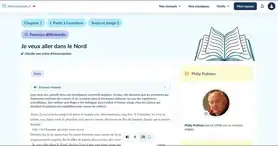Ressource affichée de l'autre côté.
Faites défiler pour voir la suite.
Faites défiler pour voir la suite.
Mission 1
Ressource affichée de l'autre côté.
Faites défiler pour voir la suite.
Faites défiler pour voir la suite.
1Numbers and figures
Do the math.
1.
Eight hundred and forty‑two minus sixtythree point eight equals
2. 1/2 + 1/4 =
2. 1/2 + 1/4 =
3.
619,000 + 2.3 =
4. Twelve times ten minus fifteen divided by five equals
4. Twelve times ten minus fifteen divided by five equals
Hint
65.3 million sixty-five → point three million
33,972 → thirty-three thousand nine hundred and seventy-two
54% → fifty-four percent
+ plus
- minus
÷ divided by
× multiplied by/times
= equals
¼one fourth, one quarter,
⅓ one third,
½ half,
¾ three fourths, three quarters
33,972 → thirty-three thousand nine hundred and seventy-two
54% → fifty-four percent
+ plus
- minus
÷ divided by
× multiplied by/times
= equals
¼one fourth, one quarter,
⅓ one third,
½ half,
¾ three fourths, three quarters
Ressource affichée de l'autre côté.
Faites défiler pour voir la suite.
Faites défiler pour voir la suite.
2Making a hypothesis
Match the modal verb phrases with the sentence that shows the degree of certainty.
1.
| can't be | |
| might be | |
| may be | |
| could be | |
| must be | |
| will be |
Hint
Can't be → 0% certainty
Might be → 25%
Could be → 75%
Must be → 95%
Might be → 25%
Could be → 75%
Must be → 95%
➜
Ressource affichée de l'autre côté.
Faites défiler pour voir la suite.
Faites défiler pour voir la suite.
Mission 2
Ressource affichée de l'autre côté.
Faites défiler pour voir la suite.
Faites défiler pour voir la suite.
3Future predictions
Make predictions for a better future.
1. wars → end
2. people → fight
3. the problem of homelessness → disappear
1. wars → end
Hint
Will + BV ≠ won't + BV
➜
Ressource affichée de l'autre côté.
Faites défiler pour voir la suite.
Faites défiler pour voir la suite.
4Expressing hypothetical future
Complete the sentences with the correct form of the verb.
1. If we (talk) more about the problem, more people (think) of a solution.
2. If we (can) erase borders, people (live) where they wanted.
3. If everyone (have) access to safe water, people (not become) so sick.
4. If we (stop) fighting, there (be) no more wars.
1. If we
2. If we
3. If everyone
4. If we
Hint
If + past simple… would + BV
➜
Ressource affichée de l'autre côté.
Faites défiler pour voir la suite.
Faites défiler pour voir la suite.
5Will vs would
Choose between will and would to show probable vs. certain future.
1.
If we study more, we have better results.
2. If it rained less, we ride our bikes to school.
2. If it rained less, we
3.
If the school closed, we not be able to study
4. If our teacher is off sick, we have a free class period.
4. If our teacher is off sick, we
Hint
If + past + would → possible future
If + present + will → certain future
If + present + will → certain future
➜
Une erreur sur la page ? Une idée à proposer ?
Nos manuels sont collaboratifs, n'hésitez pas à nous en faire part.
j'ai une idée !
Oups, une coquille

